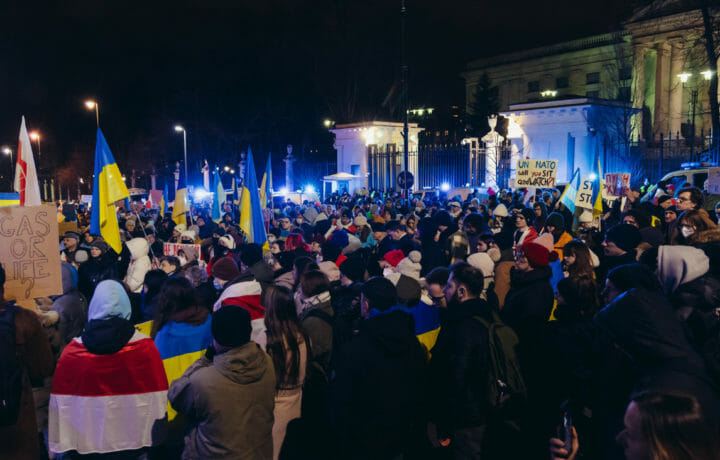UPDATE: Following Poland’s expulsion of 45 Russians from the Russian Embassy in Warsaw, a number of countries, in what is now clearly a unified action, told the Russians to go home since the invasion of Ukraine on February 24. Slovakia, requested an additional 35 Russians depart for a total of 38, they were joined by Czech Republic -2, Ireland -4, The Netherlands – 17, Belgium – 21, and North Macedonia -5.
Secretary of State, Antony Blinken, said in a statement, “The United States applauds the recent expulsions of Russian intelligence officers by our partners in Europe and around the world. As our partners have outlined, these actions are in response to these individuals’ activities, which are in contravention of their diplomatic status, and the Russian Federation’s aggression in Ukraine.”
Days after Russia invaded Ukraine, on February 28, the United States told 12 Russian intelligence officers assigned to the Russian Permanent Mission to the United Nations to leave New York and the United States. Turns out that this was just the beginning of a bevy of Russian expulsions from embassies throughout NATO countries.
Poland
On March 23, Poland ordered the expulsion of 45 Russian intelligence officers and their associates from Warsaw. The Polish Ministry of Foreign Affairs noted how 44 of the 45 had five days to exit Poland, while one of those expelled, characterized as “most dangerous” was given 48 hours to depart.
The 45th, individual, a Russian intelligence officer was caught in flagrant act, with a Polish citizen who was providing Polish government information to Russia by the Polish Internal Security Agency (ABW) on March 17. According to the Polish language media outlet, Gazeta.pl, the Polish citizen worked within the Registry Office in Warsaw, where both foreign nationals and Polish citizens registered their presence. This information was being routinely passed to Russian intelligence.
Separately the ABW announced on March 4 the arrest of a freelance journalist who was accused of being an agent of Russian military intelligence, the GRU. The ABW said the journalist used his credentials to “move freely around Europe and the world, including zones affected by armed conflicts and areas of political tension.”
Baltic States
This action by the Polish government was followed by the collaborative expulsions of 10 intelligence officers from the Baltic states, Lithuania (4), Latvia (3), and Estonia (3). The expulsions were not tagged to any specific act or acts of espionage, rather the expulsions of the Russian intelligence officers were made in solidarity with Ukraine.
Bulgaria
Contemporaneously with the Baltic states’ expulsions, Bulgaria expelled 10 Russian “diplomats”, who were given 72 hours to depart.
This expulsion was the second tranche of Russians kicked out of Bulgaria when two intelligence officers were ordered out after being suspected with meeting with a retired Bulgarian reserve general.
Slovakia
In mid-March, the Slovak government broke up a Russian spy network which resulted in four Slovak nationals being arrested, with two of them facing espionage charges. The two are suspected of working on behalf of the Russian military intelligence, the GRU. One of the two was the head of the Security and Defense Department at the Armed Forces Academy, while the other was a former member of the Slovak security service. As a result, Slovakia expelled three Russian intelligence officers and gave them 72 hours to depart the country.
United States – Washington D.C.
March clearly is not a good month for Russian intelligence, with 90-plus of their cadre wrapped up and sent home via express.
That said, the FBI in the United States is offering a sweet deal to those Russians who may have information of value.
The FBI has taken to digital advertising, and according to the Washington Post, is pushing via Google, Facebook and Twitter, geographically targeted ads at the official Russian mission buildings in Washington DC. The ad is designed to remind personnel within the Russian mission that they have an option and can call the FBI to explore these options.
The Russian counterintelligence officers in the Embassy no doubt are not happy, as they cannot sweep under the rug the existence of the FBI invitation and now have to worry about the personnel from within the Russian mission voting with their feet on Putin’s war of choice against Ukraine. While the FBI ad may not bear fruit, it serves to fertilize the insider threat within the Russian embassy.




